.jpg)
When building a website, many options are available, each with its own set of features and tools. Among the most popular website builders are Wix, Shopify, and GoDaddy, each offering unique advantages and catering to different user needs. Wix is known for its user-friendly interface and extensive design capabilities, making it a popular choice for individuals and small businesses looking to create a visually appealing website. On the other hand, Shopify is a specialized e-commerce platform that provides users with everything they need to create and manage an online store. GoDaddy is a well-established web hosting company that offers website-building tools and services.
This post comprehensively reviews Wix, Shopify, and GoDaddy, comparing their features, functionality, and performance in various categories such as pricing, ease of use, design, e-commerce capabilities, SEO, third-party integrations, and customer support. By reading this review, users can choose which website builder is best suited for their specific needs, whether for creating a personal blog, an online portfolio, or a full-fledged e-commerce store.
Wix Vs. Shopify Vs. GoDaddy: Comparative Overview
Wix, Shopify, and GoDaddy are popular website builders with many features and tools for creating and managing websites. Wix is known for its extensive design flexibility and customization options, while Shopify excels in eCommerce functionality and features. GoDaddy is a more affordable option but has limited features compared to Wix and Shopify. All three platforms offer user-friendly interfaces and a range of templates but vary in ease of use, design and customization, features and functionality, and customer support.
|
Price |
Ease of Use |
Design and Customization |
Features and Functionality |
Customer Support |
|
|
Wix |
$4.50 per month |
|
|
|
|
|
Shopify |
$19.00 per month |
|
|
|
|
| GoDaddy |
$10.99 per month |
|
|
|
|
Pricing and Value: Wix, Shopify or GoDaddy
Each platform has its strengths and weaknesses regarding pricing and value. Wix offers free and affordable premium plans, but some features require purchasing additional apps. Shopify has higher pricing tiers but includes advanced eCommerce features and third-party integrations. GoDaddy offers the most affordable plans but has limited features and customization options compared to Wix and Shopify.
Pricing Plans: Overview
|
Free |
Connect Domain |
Combo |
Unlimited |
VIP |
|
|
Wix |
$0.00 per month |
$4.50 per month |
$8.50 per month |
$12.50 per month |
$24.50 per month |
|
Basic |
Shopify |
Advanced |
Plus |
||
|
Shopify |
$25.00 per month ($1.00 for the first month) |
$65.00 per month ($1.00 for the first month) |
$399.00 per month ($1.00 for the first month) |
$2,300.00 per month (Available on a 1- or 3-year term) |
|
|
Basic |
Standard |
Premium |
Ecommerce |
||
|
GoDaddy |
$10.99 per month (with an annual term, 15% savings) |
$10.49 per month (with an annual term, 38% savings) |
$14.99 per month (with an annual term, 34% savings) |
$16.99 per month (with an annual term, 37% savings) |
Wix, Shopify, and GoDaddy each offer a range of options to suit different website needs and budgets.
Wix has a free plan that allows you to create a basic website with limited features and several premium plans ranging from $4.50 to $24.50 per month. The most popular plan is the Unlimited plan, which costs $12.50 per month and includes unlimited bandwidth, 10GB of storage, and a free domain for one year. Wix also offers specialized plans for businesses and eCommerce, which include additional features such as online booking and payment processing.
Shopify has three main pricing plans, ranging from $25.00 to $399.00 per month. The Basic Shopify plan costs $25 per month and includes all the essential features for starting an online store, such as unlimited products, a customizable checkout, and discount codes. The Shopify plan costs $65 per month and includes additional features such as gift cards and professional reports. The Advanced Shopify plan costs $399 per month and includes advanced features such as real-time carrier shipping and third-party calculated shipping rates. Shopify also offers a custom enterprise plan for high-volume businesses.
Shopify also offers a custom enterprise plan called Shopify Plus designed for high-volume businesses and large online stores. Shopify Plus starts at $2,300 per month and includes advanced features such as dedicated server hosting, custom checkout options, and advanced security features. It also offers a dedicated account manager and priority support. Shopify Plus is a highly scalable and customizable solution for businesses that require advanced eCommerce functionality and support.
GoDaddy has four pricing plans ranging from $10 to $25 per month. The Basic plan costs $10 per month and includes a mobile-responsive website, social media integration, and 24/7 customer support. The Standard plan costs $10.49 per month and includes additional features such as SEO optimization and email marketing. The Premium plan costs $14.99 per month and includes advanced features such as online appointments and customizable forms. The Ecommerce plan costs $16.99 per month and includes everything in the Premium plan and eCommerce features such as product listings and payment processing.
Value of Money
Wix offers a range of affordable plans with a variety of features, making it a good value for money for small businesses and personal websites. The free plan allows you to create a basic website without any upfront costs, while the premium plans offer additional features such as unlimited bandwidth, custom domains, and eCommerce functionality. Wix also offers many templates and customization options, making a professional-looking website easier without any design experience.
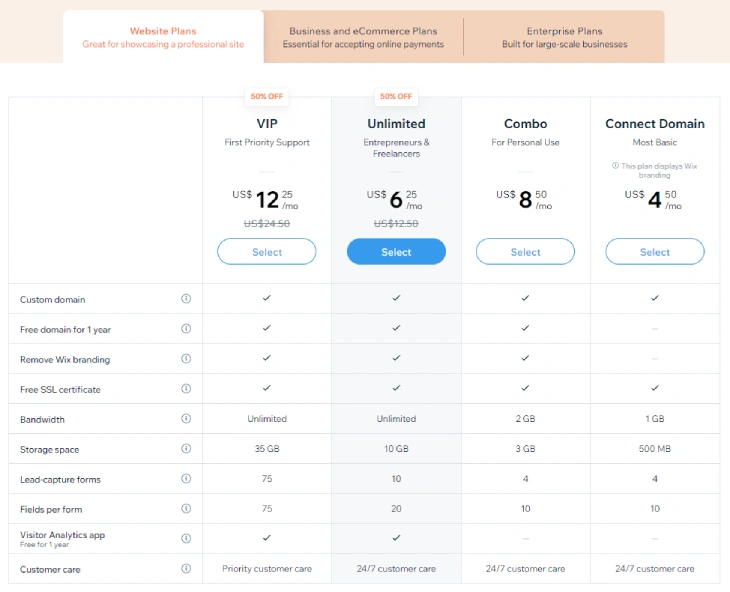
Shopify is a more expensive option, but it offers advanced eCommerce features that can be invaluable for online businesses. The pricing plans include everything you need to create and manage an online store, including payment processing, inventory management, and shipping integration. Shopify also offers a range of third-party integrations and apps, allowing you to customize your store and add additional functionality. While Shopify may be more expensive than other website builders, its advanced eCommerce features can make it a worthwhile investment for businesses selling products online.
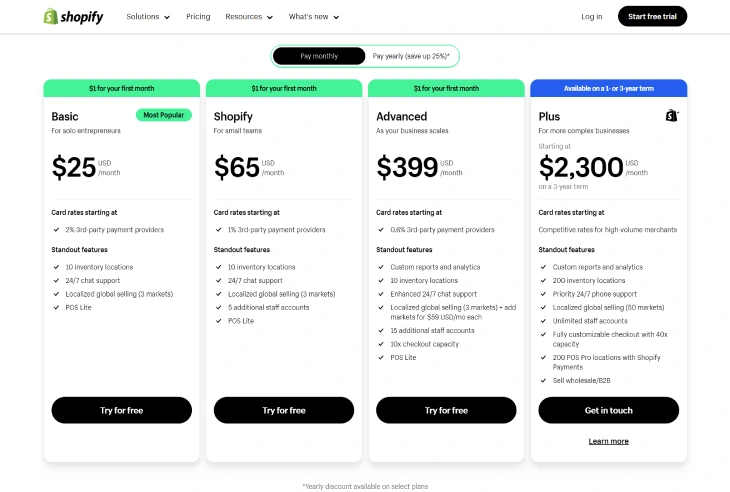
GoDaddy offers affordable pricing plans, but its features and customization options are more limited than Wix and Shopify. The plans include basic features such as social media integration and 24/7 customer support, but they lack some of the advanced features and customization options offered by Wix and Shopify. But GoDaddy's simplicity and ease of use can make it a good value for money for small businesses and personal websites that don't require advanced functionality.
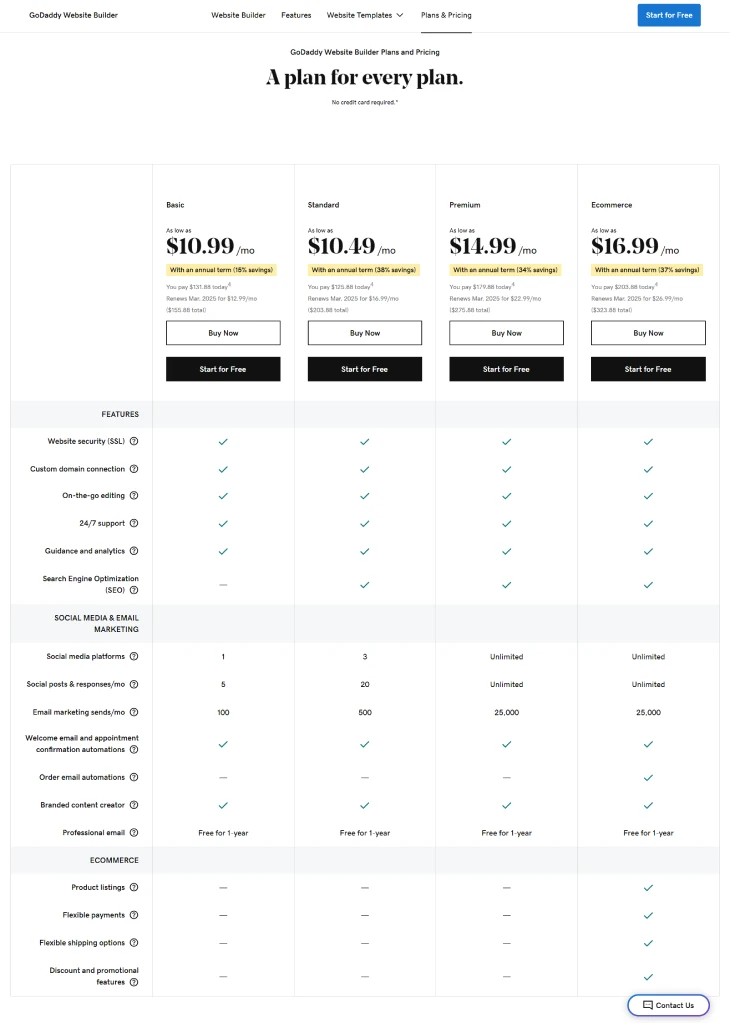
Ease of Use: Wix, Shopify or GoDaddy
All three platforms are designed to be user-friendly and intuitive. Wix offers a drag-and-drop editor that makes it easy to customize your website without any design experience. Shopify is also easy to use, with a simple interface that allows you easy online store management. GoDaddy offers a user-friendly website builder with pre-designed templates and a simple drag-and-drop editor.
Drag-and-Drop Editors
Wix is known for its powerful drag-and-drop editor, which offers a wide range of customization options and design flexibility. The editor allows you to drag and drop elements anywhere on the page, giving you complete control over the layout and design of your website. Wix also offers design features like animation and scroll effects, helping you create a unique and professional-looking website.
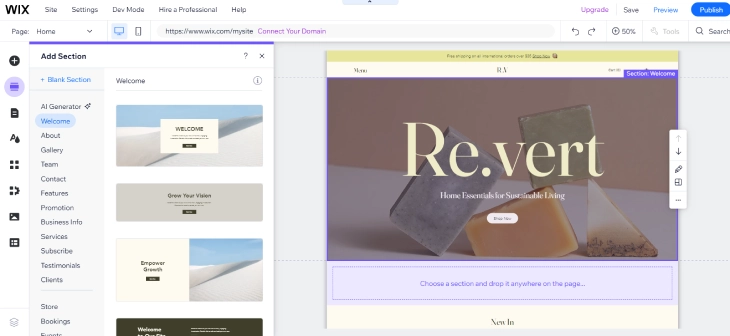
Shopify's drag-and-drop editor is more limited in design flexibility, but it is still easy to use and navigate. The editor is designed specifically for online stores, so it offers features such as product pages and checkout options. Shopify's editor also integrates with a range of third-party apps and plugins, allowing you to add additional functionality to your online store.
GoDaddy's drag-and-drop editor is similar to Wix's in functionality and ease of use. The editor allows you to drag and drop elements onto the page and offers a range of customization options such as font styles and colors. GoDaddy's editor is also designed to be mobile-responsive, so your website will look great on any device.
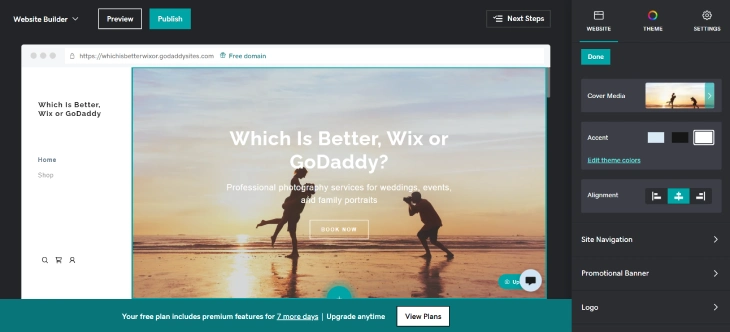
Site Navigation and Editing
Wix offers a user-friendly interface with easy-to-use site navigation and editing tools. The editor allows you to easily add and edit pages, and manage your website's content and layout. Wix also offers a range of design features, such as animation and scroll effects, that can help you create a unique and professional-looking website.
Shopify's interface is also user-friendly, with a simple editor that allows for easy online store management. The editor is designed specifically for eCommerce, offering features such as product pages and checkout options. Shopify also integrates with a range of third-party apps and plugins, allowing you to add additional functionality to your online store.
GoDaddy's interface is simple and easy to use, with a drag-and-drop editor that adds and edits pages easily. The editor is designed to be mobile-responsive, so your website will look great on any device. GoDaddy also offers a range of pre-designed templates that help you get started quickly and easily.
Design and Customization: Wix, Shopify or GoDaddy
Wix offers the most flexibility and creative control with its drag-and-drop editor and extensive range of templates. Shopify is more focused on e-commerce and offers a range of customizable templates and design features to help you create a professional online store. GoDaddy offers a simpler design experience with a more limited range of templates but still allows for some customization and branding.
Templates
All three platforms offer a range of options to choose from. Wix has over 500 templates, Shopify has over 70 templates, and GoDaddy has over 300 templates.
Wix's free templates are highly customizable and cover many industries and styles. They are also mobile-responsive which means they will automatically adjust to fit any screen size. Wix also allows you to switch templates at any time, giving you the flexibility to change the look and feel of your website whenever you want.
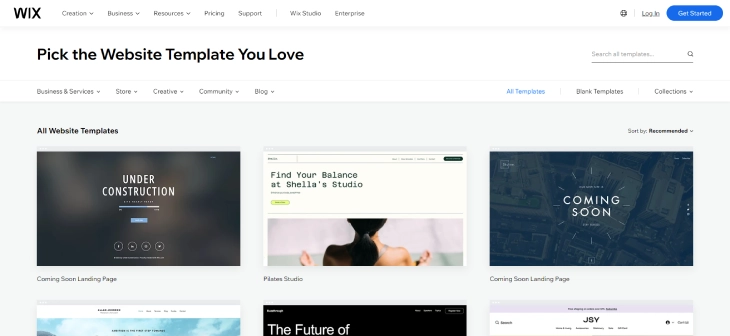
Shopify's templates are specifically designed for e-commerce and are optimized for conversion. They are also mobile-responsive and customizable, allowing you to add your branding and content. Shopify's templates are organized by industry, making it easy to find a template that fits your business needs.
GoDaddy's templates are more basic than Wix and Shopify, but they still offer a range of options to choose from. They are also mobile-responsive and customizable, allowing you to add your branding and content. GoDaddy's templates are organized by industry and style, making it easy to find a template that fits your needs.
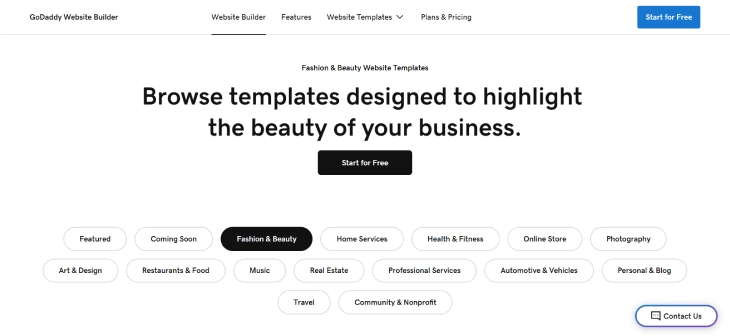
Design Flexibility
Wix offers the most creative control with its drag-and-drop editor and extensive range of customization options. Shopify is more focused on e-commerce and offers a range of design features to help you create a professional online store. GoDaddy offers a simpler design experience with a more limited range of customization options.
Features and Functionality: Wix, Shopify or GoDaddy
Wix, Shopify, and GoDaddy each offer unique features and functionality to their users. Wix is known for its extensive design capabilities and app market, while Shopify excels in e-commerce features such as inventory management and payment processing. GoDaddy offers a more simplified website builder experience with basic features for small businesses and personal websites.
eCommerce
When it comes to eCommerce, Shopify is the clear winner among the three platforms. Shopify is specifically designed for online stores and offers a comprehensive set of tools and features to help you create and manage your online business. With Shopify, you can sell physical or digital products, manage inventory, process payments, and track orders all from one platform. Shopify also integrates with a wide range of third-party apps and services, allowing you to extend the functionality of your store and streamline your business operations.
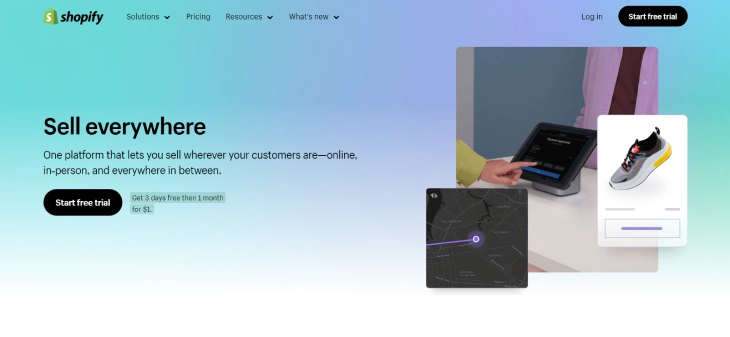
Wix also offers eCommerce functionality but is not as diverse as Shopify's. Wix eCommerce allows you to create an online store and sell products, but its features are more limited than Shopify. For example, Wix does not offer advanced inventory management or shipping options. But Wix does offer a range of templates specifically designed for online stores, making a professional-looking eCommerce site easier.

GoDaddy also offers eCommerce functionality, but it is even more limited than Wix's. GoDaddy's online store builder is designed for small businesses and individuals who want to sell a few products online. It lacks many advanced features and tools that larger online businesses require, such as inventory management and advanced shipping options. However, GoDaddy's online store builder is easy to use and offers a range of customizable templates to help you get started.
SEO
All three platforms offer SEO tools and features to help you optimize your site for search engines.
Wix offers a range of SEO tools, including the ability to customize meta titles and descriptions, create 301 redirects, and generate sitemaps. Wix also offers a built-in SEO Wiz tool that guides you through the process of optimizing your site for search engines. Some users have also reported issues with Wix's SEO functionality, such as slow page load times and issues with indexing.
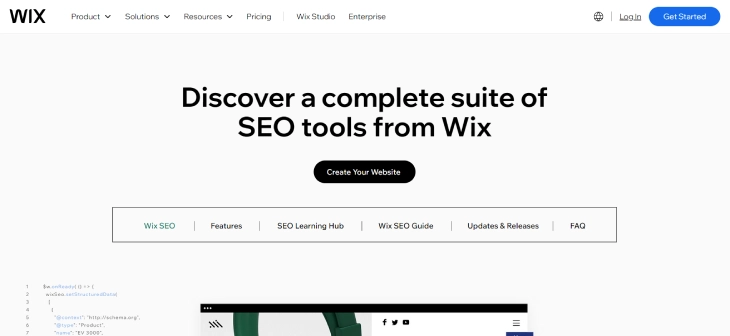
Shopify also offers a range of SEO tools, including customizable meta titles and descriptions, automatic sitemap generation, and the ability to create 301 redirects. Shopify also offers a range of advanced SEO features, such as editing your robots.txt file and adding structured data markup to your site. Shopify's SEO functionality is generally well-regarded, and many users have reported success in improving their site's search engine rankings.
GoDaddy offers basic SEO tools, including customizing meta titles and descriptions, creating 301 redirects, and submitting your site to search engines. But GoDaddy's SEO functionality is more limited than Wix and Shopify. GoDaddy does not offer advanced SEO features, such as structured data markup or the ability to edit your robots.txt file.
Third-Party Integrations
All three platforms offer a range of third-party integrations, but the availability and quality of these integrations can vary.
Wix offers a ton of third-party integrations, including marketing tools, payment gateways, and social media integrations. Wix also offers an app market where you can find and install third-party apps to extend the functionality of your site.
.webp)
Shopify also offers a range of third-party integrations, including payment gateways, shipping integrations, and marketing tools. Shopify's app store offers a range of high-quality apps that can help extend the functionality of your online store. Shopify's integrations are generally well-regarded, and many users have reported success in using third-party integrations to streamline their business operations.
GoDaddy offers a more limited range of third-party integrations than Wix and Shopify. GoDaddy offers integrations with payment gateways, social media platforms, and marketing tools. However, the availability and quality of these integrations can vary.
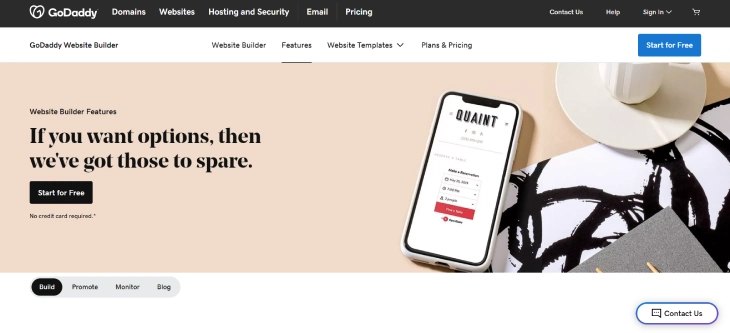
Customer Support: Wix, Shopify or GoDaddy
Wix offers phone and email support, an extensive knowledge base, and a community forum. Shopify offers 24/7 phone, email, and live chat support, and a comprehensive help center. GoDaddy offers phone and live chat support, a help center, and a community forum. It's important to note that the quality and availability of support can vary depending on the specific plan and location of the user.
Support Channel
Regarding support channels, Wix, Shopify, and GoDaddy offer various options to assist their customers. Wix provides support through phone, email, and callback services, as well as an extensive knowledge base and community forum.
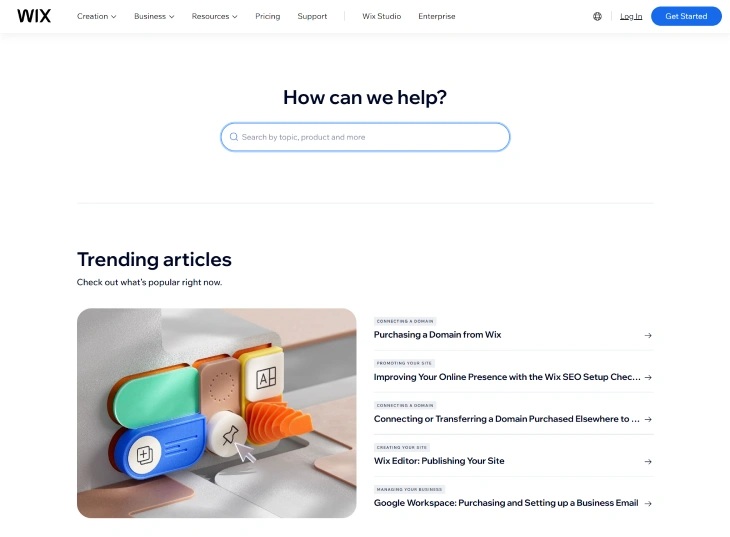
Shopify offers 24/7 support through live chat, email, and phone, as well as a comprehensive help center and community forum. GoDaddy provides support through phone and live chat, a help center, and a community forum.
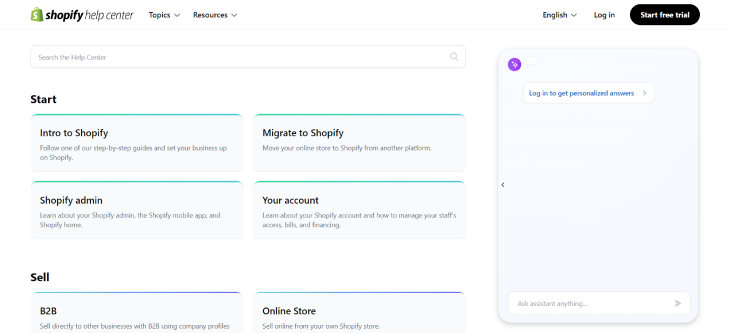
One advantage of Wix's support channel is its callback service, which allows users to schedule a time for a support agent to call them back, rather than waiting on hold. This can be especially helpful for users who can't hold for an extended period. Shopify's 24/7 support is also a significant advantage, as it ensures that users can receive assistance at any time of day, regardless of their time zone. GoDaddy's support channel, on the other hand, has received mixed reviews, with some users praising the quality of support and others finding it lacking.
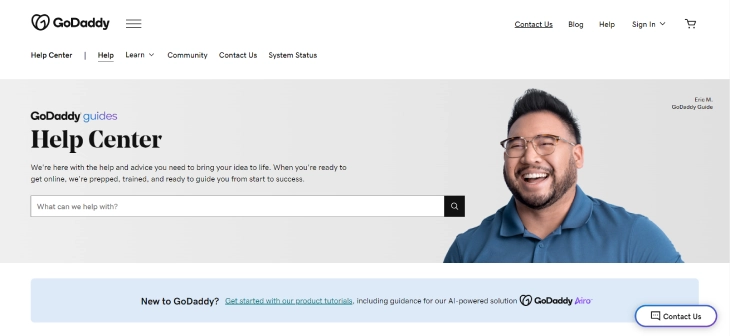
Support Quality
All three platforms have received positive feedback from users. Wix's support team is known for being knowledgeable and helpful, while Shopify's support team is praised for their responsiveness and expertise. GoDaddy's support team has also received positive feedback, although some users have reported difficulty reaching a support agent or receiving adequate assistance.
The support quality may still vary depending on the specific issue and the individual support agent, so it's important to consider multiple factors when choosing a platform based on support.
Conclusion: Which Is Better - Wix, Shopify or GoDaddy?
Choosing the right website builder depends on the needs and goals of the user. Wix, Shopify, and GoDaddy are all excellent options, each with strengths and weaknesses. Wix offers unparalleled design flexibility and a wide range of features, making it a great choice for creating a visually appealing website with advanced functionality. On the other hand, Shopify is the go-to platform for e-commerce, providing users with everything they need to create and manage a successful online store. GoDaddy is a solid choice for those looking for an affordable and easy-to-use website builder, although it may not offer as many features as its competitors.
Users should also carefully consider their needs and budget before choosing a website builder. By comparing and contrasting the features, pricing, ease of use, design options, e-commerce capabilities, and customer support of Wix, Shopify, and GoDaddy, users can make an informed decision and choose the platform that best suits their needs.
* read the rest of the post and open up an offer